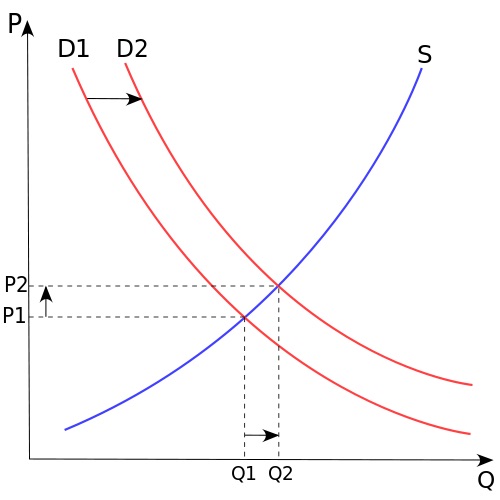I like to think of myself as extremely relational and efficient and something that’s always bothered me is marketing. I hated the idea that companies had to market their products since the cost of the marketing would just be absorbed into the price I would be paying for the final product. Of course it’s not that simple and marketing isn’t just a cost and can bring value to everyone involved. In fact, George Akerlof wrote a paper in 1970, The Market for Lemons, which describes how markets with asymmetric information end up full of “lemons” and led to a Noble Prize. One of the solutions to this problem is to do marketing since that will signal that you’re a legitimate company offering a legitimate product.
As a fun weekend activity I took a stab at using my almost forgotten college economics classes and some basic algebra to dig into the effects marketing has on price. The thesis is that marketing has two potential effects - the first is increasing the price customers are willing to pay and the second is to increase demand. Depending on the type of product or service any combination of these can happen.
We can start by taking a look at one of the first thing economics students learn: the supply and demand curve. The idea is simple and describes the relationship between price and quantity. As the price goes up the number (quantity) of items for sale (supply) increases since there are more willing sellers but the number of willing buyers (demand) drops. By finding where these two curves intersect we get to the equilibrium price and quantity that the market should end up in. Note that it’s meant to analyze markets rather than individual companies but it’s still interesting to see what happens if we approach it from the perspective of a single company offering a product with and without marketing. Without marketing we have the initial supply and demand curve with its equilibrium point. With marketing the demand curve shifts up which increases the equilibrium price and quantity sold. This makes intuitive sense - marketing will make something more “in demand” which will increase the price but to me the bigger potential impact is actually raising awareness and letting people know that the product exists. Depending on the product this can cause a massive change to the demand curve.

Supply and demand curves. Source: Wikipedia
The ideal situation for a consumer is a company has a great product that’s a bit too expensive to product and thus to sell. By investing in a marketing campaign the company is able to share how awesome its product is which can increase the demand so much that the cost to manufacture the item drops. This in turns makes the price go down which in turn feeds into more demand. These are the types of products where marketing is valuable.
A negative example of marketing (at least to the consumer) is where a company runs a marketing campaign which increases awareness of interest but instead of using that to sell more for a lower price uses the result to increase the price and sell to the same or fewer amount of people. In this case, fewer consumers benefit and the company may not be that much better off given the marketing expense.
As consumers we want to get a good deal and being able to think through the impact of the marketing is a nice way of seeing whether we’re getting our money’s worth. If a product is heavily commoditized with a ton of competition then marketing is solely meant to drive awareness and we’re better of buying the generic or store brand. Similarly, if a product has a high marginal cost and isn’t likely to get cheaper to make at scale (imagine a consulting service) then all the marketing will do is increase the price. On the other hand, if it’s a niche product that you’ve never heard of that you discovered through a marketing campaign that it may, in fact, be worth it and you’re arguably getting a cheaper product because of the marketing effort.
